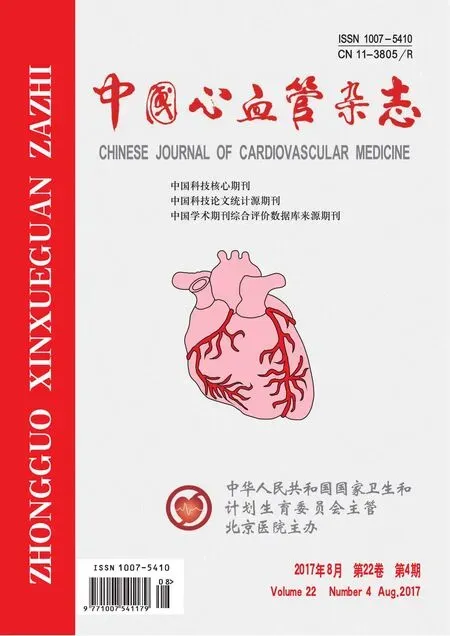基础血浆B型利钠肽水平对心力衰竭患者应用重组人B型利钠肽短期临床疗效的预测价值
刘秀叶 崔炜 谢瑞芹 杨晓红 谷国强 郑红梅 张冀东 张光明 王倩 张亚楠 杨靖
·临床研究·
基础血浆B型利钠肽水平对心力衰竭患者应用重组人B型利钠肽短期临床疗效的预测价值
刘秀叶 崔炜 谢瑞芹 杨晓红 谷国强 郑红梅 张冀东 张光明 王倩 张亚楠 杨靖
目的评价基础血浆B型利钠肽(BNP)水平对心力衰竭患者应用重组人B型利钠肽(rhBNP)短期临床疗效的预测价值。方法选取2012年12月至2013年12月在河北医科大学第二医院心内科住院的心力衰竭患者共46例,其中男性24例,女性22例,入院后在常规抗心力衰竭治疗基础上加用rhBNP,分别计量静脉应用rhBNP前24 h、后第1、2和3个24 h液体出入量,计算每日净出量,分别将用药后每日净出量减去用药前净出量计为患者应用rhBNP后连续3个24 h的利尿效果,结合患者用药后整体临床状况改善程度评估rhBNP的短期临床疗效。基础血浆BNP值于应用rhBNP之前测定,依据其四分位数进行分组,比较血浆BNP不同水平组间rhBNP利尿效果及整体临床状况改善程度。采用双变量相关分析评价rhBNP利尿效果与基础血浆BNP水平之间的相关性。结果所有患者基础血浆BNP值380~5 000 pg/ml[1 225 pg/ml(1 689 pg/ml)]。依据基础血浆BNP水平四分位数进行分组,基础血浆BNP不同水平组间应用rhBNP后第1个24 h的利尿效果差异有统计学意义(F=3.132,P=0.035)。应用rhBNP泵点后第1个24 h利尿效果与基础血浆BNP值呈负相关(r=-0.412,P<0.01);第2个24 h利尿效果与基础血浆BNP值呈负相关趋势(r=-0.059,P=0.69);第3个24 h利尿效果与基础血浆BNP值呈负相关(r=-0.292,P=0.049)。基础血浆BNP不同水平组间患者整体临床情况改善程度差异有统计学意义(χ2=18.815,P=0.03)。结论基础血浆BNP水平高的心力衰竭患者较BNP水平低的患者应用rhBNP的短期临床效果欠佳;心力衰竭患者应用rhBNP的短期利尿效果与基础血浆BNP水平呈负相关;基础血浆BNP水平对心力衰竭患者应用rhBNP的短期治疗效果具有一定预测价值。
利钠肽,脑; 心力衰竭; 治疗结果
【Keywords】 Natriuretic peptide, brain; Heart failure; Treatment outcome
重组人B型利钠肽(recombinant human brain natriuretic peptide,rhBNP)是肾素-血管紧张素-醛固酮的天然拮抗剂,可降低心脏的前、后负荷,发挥排钠、利尿、扩血管等改善心力衰竭的有益作用,目前在国际上广泛应用并获得了较为满意的疗效[1-2]。但在我们的临床实践中发现,rhBNP用于血浆B型利钠肽(B-type natriuretic peptide,BNP)水平较高的心力衰竭患者的短期临床疗效欠佳。本研究旨在通过前瞻性的观察,探讨不同血浆BNP水平心力衰竭患者应用rhBNP的短期利尿效果,评价基础血浆BNP水平对心力衰竭患者应用rhBNP短期临床疗效的预测价值。
1 对象和方法
1.1 研究对象
选取2012年12月至2013年12月在河北医科大学第二医院心内科住院的心力衰竭患者共46例,其中男性24例,女性22例,年龄21~91岁,平均(60.3±18.6)岁。所有入选对象均为诊断明确的心力衰竭患者,符合纽约心脏病协会(NYHA)心功能分级Ⅲ~Ⅳ级,或急性心肌梗死Killip分级Ⅲ级。除外低血压或心原性休克。
1.2 研究方法
入院后给予常规治疗(包括洋地黄类及非洋地黄类正性肌力药、利尿剂、血管紧张素转换酶抑制剂、血管扩张剂等)效果不佳的患者,在原有治疗基础上加用rhBNP(商品名:新活素;批号:S20050033;生产厂家:成都诺迪康生物制药有限公司)静脉注射(负荷量1.5 μg/kg之后以0.007 5 μg·kg-1·min-1连续静脉给药至少3 d)。多巴胺、利尿剂等在应用rhBNP前后尽可能保持一致,但对部分症状较重的患者可根据临床需要调整利尿剂剂量。不同利尿剂用量及剂量换算规则:静脉用药,呋塞米40 mg=托拉塞米20 mg =布美他尼1 mg =口服呋塞米80 mg[3],均换算为静脉用呋塞米用量进行统计分析。
应用rhBNP之前静脉取血测定血浆BNP作为其基础值。测定方法:荧光免疫法,采用B型钠尿肽荧光免疫测试板对血浆BNP进行定量测定,仪器为Triage Meterplusy荧光免疫分析仪,药盒为配套BNP荧光免疫检测试剂盒,由美国Biosite公司生产。15 min即可检测出结果。依据基础血浆BNP水平四分位数进行分组,比较血浆BNP不同水平组间rhBNP利尿效果及整体临床状况改善程度。
1.3 观察指标
(1)患者基本情况,包括性别、年龄、血压、血液学检查(肾功能、电解质等),计算内生肌酐清除率,临床相关疾病及合并用药等情况;(2)记录患者静脉用rhBNP前24 h、用药后连续3 d每天液体出入量,计算每日净出量,分别将用药后每日净出量减去用药前净出量计为患者应用rhBNP后连续3个24 h的利尿效果;(3)临床状况改善程度,分为明显好转、一般好转、无变化、恶化4个等级。明显好转:患者呼吸困难、水肿等全身临床症状体征消失,心功能改善Ⅱ级以上;一般好转:患者全身临床症状体征有所改善,但未完全消失,心功能改善Ⅰ级;无变化:患者临床症状体征无改善,心功能无改善;恶化:患者临床症状体征加重,心功能恶化。
1.4 统计学方法

2 结果
2.1 rhBNP利尿效果分析
所有患者基础血浆BNP值380~5 000 pg/ml[1 225 pg/ml(1 689 pg/ml)]。依据血浆BNP水平四分位数进行分组,分为≤658 pg/ml组(11例)、659~1 225 pg/ml组(12例)、1 226~2 347 pg/ml组(12例)、≥2 348 pg/ml组(11例)。各组的基本特征、基础疾病及用药情况比较差异均无统计学意义(表1)。分别比较用药后第1、2和3个24 h的rhBNP利尿效果,显示基础血浆BNP不同水平组间用药后第1个24 h利尿效果差异有统计学意义(F=3.132,P=0.035)。应用直线相关分析分析基础血浆BNP水平与rhBNP利尿效果的相关性,结果显示应用rhBNP泵点后第1个24 h利尿效果与基础血浆BNP值呈负相关(r=-0.412,P<0.01);第2个24 h利尿效果与基础血浆BNP值呈负相关趋势(r=-0.059,P=0.69);第3个24 h利尿效果与基础血浆BNP值呈负相关(r=-0.292,P=0.049)。随着基础血浆BNP水平升高,rhBNP的利尿效果呈明显下降趋势。

表1 基础血浆BNP不同水平组间的特征比较
注:BMI:体质指数;SBP:收缩压;DBP:舒张压;GFR:肾小球滤过率

表2 基础血浆BNP不同水平组间患者整体临床状况改善程度比较[例(%)]
2.2 整体临床情况改善程度

3 讨论
正常情况下,BNP主要储存于心室肌内,心力衰竭时心室壁张力增加,心肌细胞受到牵拉,使心室肌细胞BNP合成与分泌增加,血浆BNP浓度升高。因此,血浆BNP水平的异常变化可以显示心脏功能的变化,是心力衰竭敏感而又特异的指标。血浆BNP检测可提高心力衰竭诊断的准确性[4-5],并且可以反映心力衰竭的严重程度[6-8]。临床治疗中常对心力衰竭常规治疗欠佳的患者加用rhBNP静脉泵注,目前已有大量临床证据表明rhBNP对治疗心力衰竭有良好的临床效果[9-12]。rhBNP可扩张肾小球入球小动脉并抑制近曲小管对钠的重吸收,提高肾小球滤过率,产生明显的利尿作用[13];抑制肾素-血管紧张素-醛固酮系统,降低心脏前、后负荷,并增加心输出量;改善血管及肾脏的血流动力学平衡;拮抗神经激素活性,抑制心肌肥厚增殖,逆转心室重构[14-15]。本研究显示,在常规抗心力衰竭治疗基础上对于不同BNP水平心力衰竭患者给予同等剂量的rhBNP,产生的利尿效果明显不同。基础血浆BNP高水平组心力衰竭患者应用rhBNP利尿效果较差,利尿效果与基础血浆BNP水平呈负性相关。我们的研究还表明,基础血浆BNP不同水平组间患者整体临床情况改善程度亦有统计学差异,基础血浆BNP低水平组患者的整体临床状况好转率高于BNP高水平组的患者,故基础血浆BNP水平亦可用于预测心力衰竭患者应用rhBNP的短期治疗效果。出现这种现象的可能原因分析如下:(1)在慢性心力衰竭患者,机体对BNP水平升高产生耐受,我们称之为“BNP抵抗”。这种抵抗与2型糖尿病患者胰岛素抵抗的现象相似。既往基础研究表明,在心力衰竭患者中肾脏及血管对BNP的反应性均下降[16];(2)BNP水平较高的患者心力衰竭多较重,较重的心力衰竭患者应用BNP效果较差也是可以理解的。
本研究虽然提出了BNP抵抗的假想,但本研究样本量较小,还需今后针对不同病情的患者,给予不同剂量的rhBNP进行对比研究,并进行相关基础研究,为这一概念的提出提供更可靠的临床依据。
利益冲突:无
[1] Silver MA, Horton DP, Ghali JK, et al.Effect of nesiritide versus dobutamine on short-term outcomes in the treatment of patients with acutely decompensated heart failure [J].J Am Coll Cardiol, 2002, 39(5):798-803.
[2] Menon SG, Mills RM, Schellenberger U, et al.Clinical implications of defective B-type natriuretic peptide [J].Clin Cardiol, 2009, 32(12):E36-41.DOI:10.1002/clc.20480.
[3] Gottlieb SS, Stebbins A, Voors AA, et al.Effects of nesiritide and predictors of urine output in acute decompensated heart failure:results from ASCEND-HF(acute study of clinical effectiveness of nesiritide and decompensated heart failure)[J].J Am Coll Cardiol, 2013, 62(13):1177-1183.DOI:10.1016/j.jacc.2013.04.073.
[4] Kelder JC, Cowie MR,McDonagh TA, et al.Quantifying the added value of BNP in suspected heart failure in general practice:an individual patient data meta-analysis [J].Heart, 2011, 97(12):959-963.DOI:10.1136/hrt.2010.220426.
[5] 曾学寨, 刘德平.2016年欧洲心脏病协会心力衰竭指南解读 [J].中国心血管杂志, 2016, 21(5):355-358.DOI:10.3969j.issn.1007-5410.2016.05.004.
Zeng XZ, Liu DP.Interpretation of 2016 ESC guideline for the diagnosis and the treatment of chronic heart failure [J].Chin J Cardiovasc Med, 2016, 21(5):355-358.DOI:10.3969j.issn.1007-5410.2016.05.004.
[6] Del RS, Clerico A, Giannessi D, et al.Measurement of brain natriuretic peptide in plasma samples and cardiac tissue extracts by means of an immunoradiometric assay method [J].Scand J Clin Lab Invest, 2000, 60(2):81-90.
[7] Wieczorek SJ, Wu AH, Christenson R, et al.A rapid B-type natriuretic peptide assay accurately diagnoses left ventricular dysfunction and heart failure:a multicenter evaluation [J].Am Heart J, 2002, 144(5):834-839.
[8] 王紫晨, 魏占云, 何婧瑜, 等.老年慢性心力衰竭患者同型半胱氨酸与N末端B型利钠肽原、左心室结构和功能的相关性[J].临床荟萃, 2016, 31(6):644-648.DOI:10.3969/j.jssn.1004-583X.2016.06.014.
Wang ZC, Wei ZY, He JY, et al.Correlation of homocysteine, N-terminal B-type natriuretic peptide, structure and function of left ventricular in elderly patients with chronic heart failure[J].Clin Focus, 2016, 31(6):644-648.DOI:10.3969/j.jssn.1004-583X.2016.06.014.
[9] Publication Committee for the VMAC Investigators(Vasodilatation in the Management of Acute CHF).Intravenous nesiritide vs nitroglycerin for treatment of decompensated congestive heart failure:a randomized controlled trial [J].JAMA, 2002, 287(12):1531-1540.
[10] 周欣荣, 孙惠萍, 王坤, 等.重组人脑利钠肽治疗急性心力衰竭疗效观察[J].中华实用诊断与治疗杂志, 2011, 25(8):763-765, 768.
Zhou XR, Sun HP, Wang K, et al.Effect of recombinant human brain natriuretic peptide on patients with acute heart failure[J].Journal of Chinese Practical Diagnosis and Therapy, 2011, 25(8):763-765, 768.
[11] 重组人脑利钠肽临床研究协作组.重组人脑利钠肽和硝酸甘油治疗急性失代偿性心力衰竭疗效和安全性的随机、开放、平行对照的多中心临床研究[J].中华心血管病杂志, 2006, 34(3):222-226.DOI:10.3760/j:issn:0253-3758.2006.03.009.
Recombinant Human Brain Natriuretic Peptide Study Group.Com-parison of the effects of intravenous recombinant human brain natriuretic peptide and nitroglycerin in patients with decompensated acute heart failure:a multicenter, randomized, open-label, parallel-design study [J].Chinese Journal of Cardiology, 2006, 34(3):222-226.DOI:10.3760/j:issn:0253-3758.2006.03.009.
[12] Yancy CW, Saltzberg MT, Berkowitz RL, et al.Safety and feasibility of using serial infusions of nesiritide for heart failure in an outpatient setting(from the FUSION I trial)[J].Am J Cardiol, 2004, 94(5):595-601.DOI:10.1016/j.amjcard.2004.05.022.
[13] Mills RM, LeJemtel TH, Horton DP, et al.Sustained hemodyn-amic effects of an infusion of nesiritide(human b-type natriuretic peptide)in heart failure:a randomized, double-blind, placebo-controlled clinical trial.Natrecor Study Group [J].J Am Coll Cardiol, 1999, 34(1):155-162.
[14] 汪涛, 李恩, 刘宗芳.重组人脑利钠肽治疗C型心力衰竭患者的临床疗效观察 [J].临床荟萃, 2009, 24(9):797-798.
Wang T, Li En, Liu ZF.The clinical efficacy of recombinant human brain natriuretic peptide in C-type heart failure patients [J].Clin Focus, 2009, 24(9):797-798.
[15] Burnasheva GA, Napalkov DA.Natriuretic Peptides:Role in Current Cardiology [J].Vestn Ross Akad Med Nauk, 2015,(5):568-572.
[16] Díez J.Chronic heart failure as a state of reduced effectiveness of the natriuretic peptide system:implications for therapy[J].Eur J Heart Fail, 2017,19(2):167-176.DOI:10.1002/ejhf.656.
(本文编辑:谭潇)
PredictivevaluesofbaselineplasmaB-typenatriureticpeptidelevelsforshort-termclinicalefficacyofrecombinanthumanbrainnatriureticpeptideinheartfailurepatients
LiuXiuye,CuiWei,XieRuiqin,YangXiaohong,GuGuoqiang,ZhengHongmei,ZhangJidong,ZhangGuangming,WangQian,ZhangYanan,YangJing
DepartmentofCardiology,theSecondHospitalofHebeiMedicalUniversity,InstituteofCardiocerebrovascularDiseaseofHebeiProvince,Shijiazhuang050000,China(LiuXiuyewasagraduatestudent,nowworkunitistheFirstHospitalofHebeiMedicalUniversity)
Correspondingauthor:CuiWei,Email:cuiwei@medmail.com.cn
ObjectiveTo evaluate the predictive values of baseline plasma B-type natriuretic peptide(BNP)levels for short-term clinical efficacy of recombinant human brain natriuretic peptide(rhBNP)in patients with heart failure.MethodsA total of 46 heart failure patients including 24 males and 22 females were selected between December 2012 and December 2013.For these patients rhBNP was used subsequent to appropriate conventional therapies for heart failure.24 hours fluid input and output were recorded before and the first, second, third 24 hours after drug used.The difference value of 24-hour output day 1, day 2, day 3 after rhBNP and 24-hour output before rhBNP was defined as primary endpoint.The degree of improvement in overall clinical condition was also recorded after drug used.Baseline plasma concentrations of BNP were measured before rhBNP administration.According to the plasma BNP quartile to compare diuretic effect and degree of improvement in overall clinical status.Bivariate correlation was used to analyze the relationship between baseline BNP levels and the diuretic effect.ResultsThe baseline BNP concentrations ranged from 380 pg/ml to 5 000 pg/ml, with a median of 1 225 pg/ml.According to the plasma BNP quartile, diuretic effect of the first 24 hours after drug administration showed a significant difference among four groups(F=3.132,P=0.035).There was a significant negative correlation between baseline BNP levels and the diuretic effect of the first 24 hours(r=-0.412,P<0.01).A negative correlation trend was found between baseline BNP value and the diuretic effect of the second 24 hours(r=-0.059,P=0.69).The diuretic effect of the third 24 hours and baseline plasma BNP values were negatively correlated(r=-0.292,P=0.049).The degree of improvement in overall clinical status was statistically significant among the BNP groups(χ2=18.815,P=0.03).ConclusionsThe heart failure patients with higher BNP levels have a poor short-term clinical efficacy after rhBNP administration than the patients with lower BNP levels.The short-term diuretic effect of rhBNP is negatively correlated with baseline plasma BNP levels.Baseline BNP levels can be used to predict the short-term clinical efficacy of rhBNP in heart failure patients.
崔炜,电子信箱:cuiwei@medmail.com.cn
10.3969/j.issn.1007-5410.2017.04.003
2016-08- 29)
050000 石家庄,河北医科大学第二医院心内科 河北省心脑血管病研究所
注:刘秀叶系研究生,现工作单位为河北医科大学第一医院

